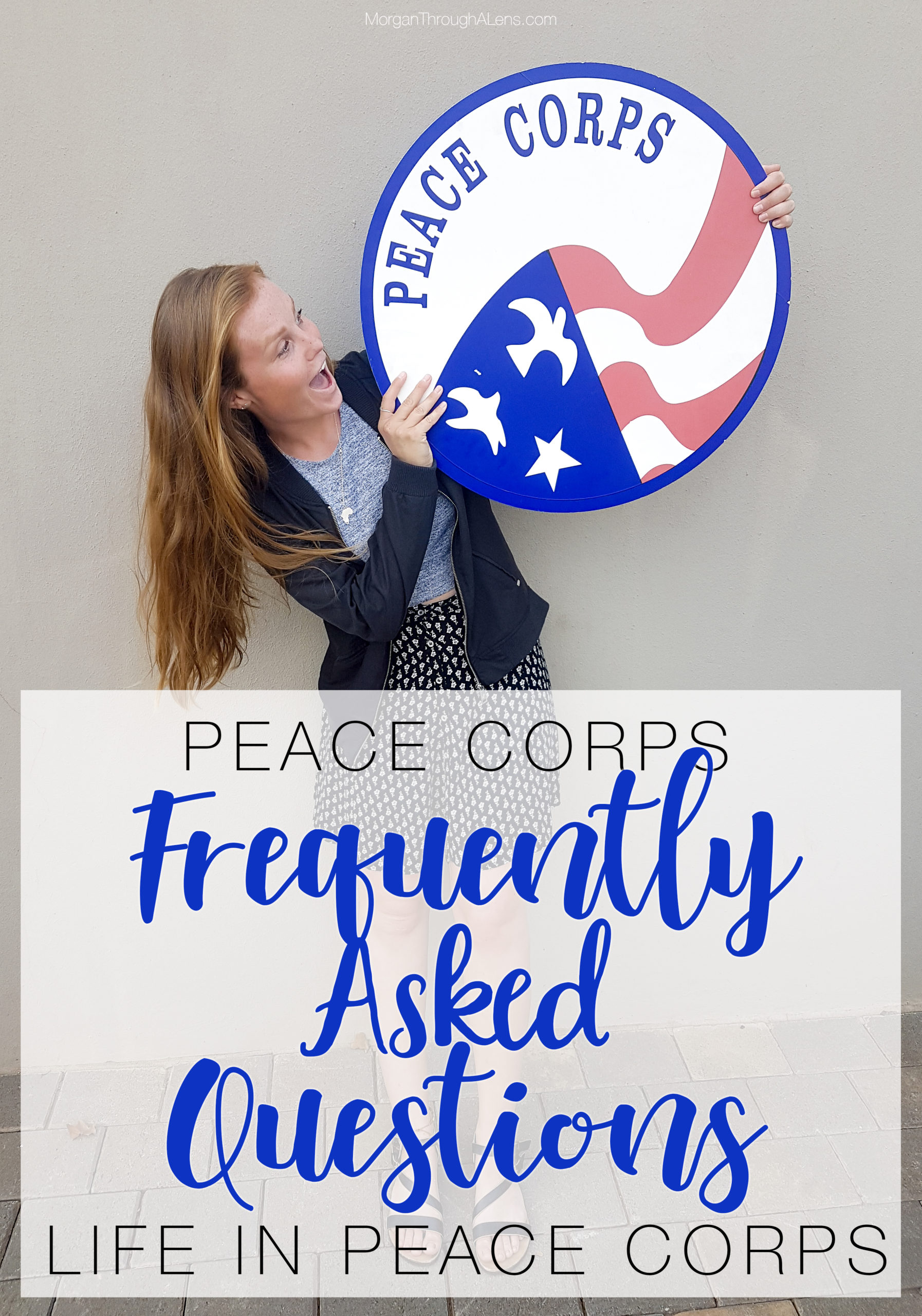Peace Corps FAQ // Life in Peace Corps
The third in a four-part series answering frequently asked questions about Peace Corps.
Part 1: Applying to Peace Corps
Part 2: Training & Work
Part 3: Life in Peace Corps
Part 4: Everything else
I compiled the most common questions from my blog and YouTube comments, emails, etc. but if you want to know something that I haven’t addressed here, or have a question for another part, leave it in the comment section!
Disclaimer: I can only speak to Peace Corps South Africa and my service specifically. Every PCV has a different experience whether in different countries or the same. If you are interested in applying to PC, talk to as many people as you can to get an accurate picture of life in Peace Corps.
What are the living conditions like for volunteers?
Living conditions vary drastically from country to country and even village to village. I recommend watching Peace Corps house tour videos (like mine here) to get a better idea of the living situation in different areas. You can also watch my Day In The Life video (or any of my YouTube videos haha) to see what a typical day looks like in PCSA.

What are the biggest adjustments at site and in Peace Corps?
My top six adjustments were…
- Isolation: I lived in a village with many amazing, friendly people who soon became my second family, but initially being isolated from friends and family back home, fellow volunteers (because we lived in separate villages), American culture, etc. was extremely difficult.
- Culture shock: Whether it’s the food, dress, appropriate behaviors, language, etc. it all takes adjustment.
- Lack of amenities: To be honest, I got used to this pretty quickly. I didn’t mind bucket bathing, it just took some time figuring out the most effective way to do so; I quickly learned that planning ahead for electricity outages was essential; and now I kind of miss the hot, noisy, crowded public taxis.
- Peace Corps Rules: If you think you’re an independent adult who can choose what to do and when and where to do it, you are mistaken. PC makes these rules in the name of safety, but having to tell your supervisor where you’re going every time you leave your village becomes a bit frustrating.
- Accepting that I can’t help everyone: The absolute hardest thing for me was seeing extreme poverty up close and personal and knowing that I couldn’t help everybody. Kids beg you for food, but you don’t have enough to feed everyone; parents want money for their kids’ school fees, but you can’t support an entire village. Wanting to help everyone and not being able to is extremely tough.
- Feeling like you aren’t helping anyone: I think this is a common sentiment among PCVs. It’s easy to get caught up in the bad thoughts and think that you aren’t making a difference, but I promise you are. It may not be the impact you envisioned, but it’s there.
How bad is the homesickness?
Depends on the person; depends on the day.
Can I leave Peace Corps before two years?
The short answer: yes. There seems to be a myth that Peace Corps somehow forces volunteers to stay for two years, but that is simply false (and illegal). Although it’s true that a full Peace Corps service is 27 months (three months of training + 24 months of service) there are many reasons someone could leave before those two years are over.
These are the ways a PCV can end their service:
- Close of Service (COS): The successful completion of service after 27 months.
- Early Termination (ET): If you decide to leave early for whatever reason.
- Administration Separation: If you break the rules and Peace Corps kicks you out.
- Medical Separation: If you get so sick you can no longer serve.
- Interrupted Service: If you need to leave due to something outside your control. For example, if a site is evacuated for safety reasons.
Can I take vacations during service? Can I travel internationally?
Of course! Each PCV gets 2 days of vacation for every month of service (for a total of 48 accumulated days). You can also take one weekend each month to visit other volunteers or put it towards vacation. The only time you can’t travel is the first and last three months of service. However, these policies change a lot depending on the country and who the Director is during the time.
Is Peace Corps safe?
Every Peace Corps post has a designated Safety and Security team that works to ensure the safety of every volunteer. They are available to PCVs 24/7 for safety and security issues. In addition, there are safety standards for the villages and organizations in which volunteers live and work. Honestly, sometimes it feels like Peace Corps is overly cautious.
How often and how easily can I communicate with people back home in the States?
I could communicate almost daily with people back home using WhatsApp (an international texting app). Sometimes service was bad or power outages cut off cell phone towers, but that didn’t happen too often. I rarely got to call or video chat unless I was in the city with free WiFi.
Does Peace Corps offer medical services?
Yes! Each Peace Corps post has a designated medical team consisting of doctors and nurses to attend to your every need. They have a phone with them 24/7 for any medical emergencies. Many people say Peace Corps provides the best health insurance you’ll ever have and I completely agree. I had surgery during my service and Peace Corps paid for the whole thing (seriously, I didn’t pay a cent)! I also fractured my ankle during service and they took care of all my treatment.
Can I take medication during Peace Corps?
Definitely. Any pre-existing condition needs to be disclosed during the application process so that PC can determine if they can support that condition while abroad. If they can, they will provide all the medicine and support you need for that condition throughout your service. If something comes up during service, they can also prescribe medication and treatment.
Does Peace Corps offer therapy?
This is an evolving issue within Peace Corps worldwide. I wrote about my experience with mental health issues in Peace Corps and how staff handles therapy, anxiety, medication, etc. and you can read it here.
What is the risk of illness?
Like travel in any foreign country, illness is possible. Peace Corps does their best to teach volunteers to avoid illness but they also provide treatment in case something happens.
Do PCVs take malaria prophylaxis?
I didn’t take anti-malaria medicine because malaria wasn’t present in my village, but some volunteers do take prophylaxis. In fact, if you live in a malaria area, you HAVE to take prophylaxis whether you want to or not. Skipping malaria meds can result in removal from Peace Corps.
Do volunteers use a water filter?
Yep! Some volunteers let their bodies slowly adjust to village water, but I didn’t want to risk it. Plus, PC provides water filters for free, so why not use it?
Is the PC stipend sufficient?
The PC stipend (aka “salary”) changes from country to country. The stipend is intended to cover food, transport, electricity, and other activities (housing is covered by PC). During my time in South Africa we made about 3500 rand (around 300 usd) each month. The stipend is enough to cover the basics, but any travel requires additional funds.
What is service like for LGBTQ+ people?
In terms of LGBTQ+ in SA: there are a handful of LGBTQ+ PCVs. Of those who are out to other PCVs, only a small percentage are out to their communities. There is a group for LGBTQ+ PCVs and opportunities for them to support each other outside the general PC support system.
Do you have any other questions about life in Peace Corps? Let me know in the comments!

